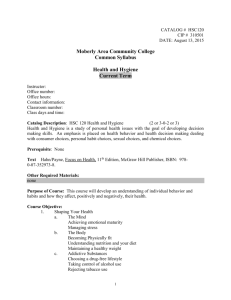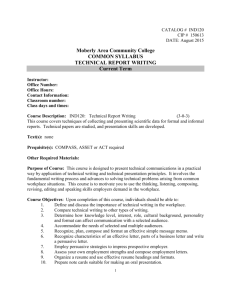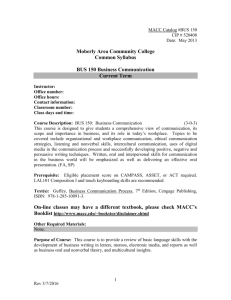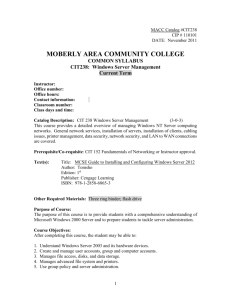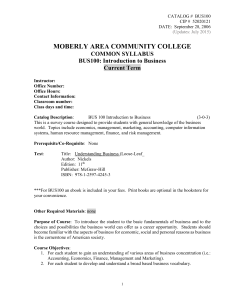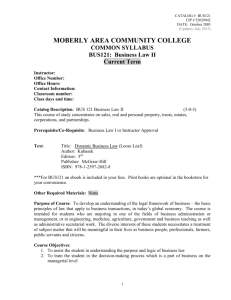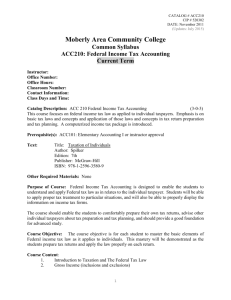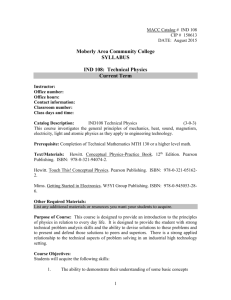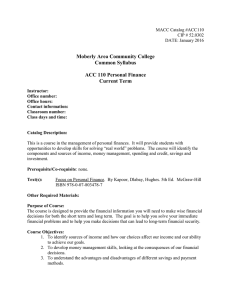Common Syllabus - Moberly Area Community College
advertisement
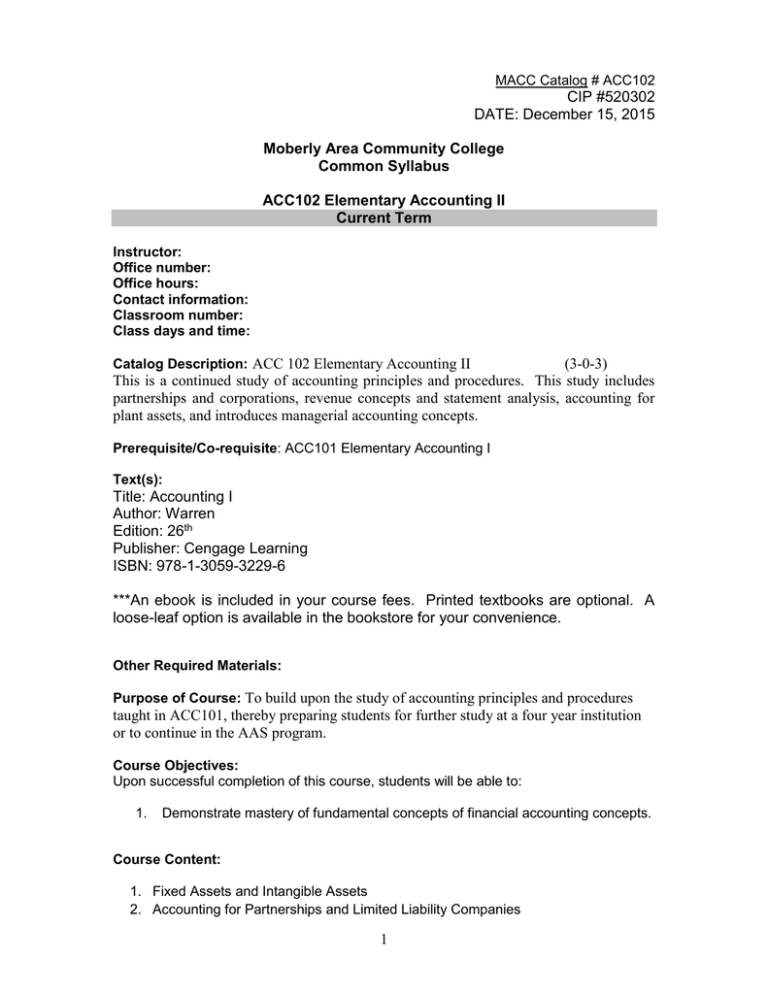
MACC Catalog # ACC102 CIP #520302 DATE: December 15, 2015 Moberly Area Community College Common Syllabus ACC102 Elementary Accounting II Current Term Instructor: Office number: Office hours: Contact information: Classroom number: Class days and time: Catalog Description: ACC 102 Elementary Accounting II (3-0-3) This is a continued study of accounting principles and procedures. This study includes partnerships and corporations, revenue concepts and statement analysis, accounting for plant assets, and introduces managerial accounting concepts. Prerequisite/Co-requisite: ACC101 Elementary Accounting I Text(s): Title: Accounting I Author: Warren Edition: 26th Publisher: Cengage Learning ISBN: 978-1-3059-3229-6 ***An ebook is included in your course fees. Printed textbooks are optional. A loose-leaf option is available in the bookstore for your convenience. Other Required Materials: Purpose of Course: To build upon the study of accounting principles and procedures taught in ACC101, thereby preparing students for further study at a four year institution or to continue in the AAS program. Course Objectives: Upon successful completion of this course, students will be able to: 1. Demonstrate mastery of fundamental concepts of financial accounting concepts. Course Content: 1. Fixed Assets and Intangible Assets 2. Accounting for Partnerships and Limited Liability Companies 1 3. 4. 5. 6. 7. 8. 9. Corporations: Organization, Stock Transactions, and Dividends Long-Term Liabilities: Bonds and Notes Investments and Fair Value Accounting Financial Statement Analysis Managerial Accounting Concepts and Principles Job Order Costing Process Cost Systems Connection with Career and Technical Education (CTE) Outcome Statement: In compliance with MACC’s CTE outcomes, the student who successfully completes this course will be able to: Think critically while systematically assessing problems, identifying issues and implementing solutions. Students will be required to complete problems with multiple steps. Demonstrate skill mastery and will pursue lifelong learning in their field while adapting to changing industry standards and following evidence-based practices. Students will demonstrate skill mastery for each item presented in course content. ASSESSMENT OF STUDENT LEARNING Grade Scale: A = 90-100% B = 80-89% C = 70-79% D = 60-69% F = 59 and below Assessment: [State the way learning outcomes will be measured. They may be measured through, by not limited to, the following: objective and essay questions, papers, quizzes, oral presentations, class participation, small group work, and/or projects.] Description of Assignment(s)/Project(s): INSTRUCTOR POLICIES Tardiness: Per instructor’s policy Make-up and late work: Per instructor’s policy 2 Extra-credit work: Per instructor’s policy Schedule of Student Assignments/Activities: [Instructors will identify a Student Assignment/Activities schedule. Instructors have the prerogative to construct the schedule by class periods, weeks, or an overview of topics to be covered.] Other: List any other instructor policies COLLEGE POLICIES Attendance: Any student who misses two consecutive weeks of class during a regular sixteen-week semester or the equivalent proportion of class time during a shorter session will be dropped from the class by the instructor unless acceptable justification is supplied. Additionally, any student who misses more than one-fourth of the entire number of inseat class meetings in a regular 16-week semester or the equivalent proportion of class time during a shorter session, may be dropped from that class by the instructor if, in the opinion of the instructor, the student does not have reasonable opportunity to succeed in the class. A student’s attendance rate will be calculated based upon the first day of the semester (not the student’s date of enrollment in the course). Student attendance must be defined in a different manner for online, hybrid, and virtual courses. Student attendance in these courses is defined as active participation in the course. Online, hybrid, and virtual courses will, at a minimum, have weekly mechanisms for student participation, such as any or all of the following methods: a. Completion of quizzes or exams b. Submission of assignments c. Participation in threaded discussions d. Communication with the instructor A student who does not participate in an online, hybrid, or virtual course for two consecutive weeks will be dropped by the instructor unless acceptable justification is supplied. As with ground courses, a student’s attendance rate in online courses will also be calculated based upon the first day of the semester. If a student does not demonstrate active participation in the online course within the first two weeks (or the equivalent proportion of class time during a short session), the student will be dropped as “never attended.” Simply logging into an online class does not constitute active participation. Students should be aware that their dropping a course and their last date of attendance in the course may impact their financial aid. Academic Dishonesty: 3 MACC board policy is as follows: “Academic dishonesty by students damages institutional credibility and unfairly jeopardizes honest students; therefore, it will not be tolerated in any form.” Forms of academic dishonesty include but are not limited to the following: violations of copyright law, plagiarism, fabrication, cheating, collusion, and other academic misconduct. Incidents of dishonesty regarding assignments, examinations, classroom/laboratory activities, and/or the submission of misleading or false information to the College will be treated seriously. The procedure for handling academic dishonesty is outlined in the Student Handbook (Policy Handbook M.010). In cases of alleged academic dishonesty, the burden of proof is on the student, not on the instructor. ADA Statement: Students who have disabilities that qualify under the Americans with Disabilities Act may register for assistance through the Office of Access and ADA Services. Students are invited to contact the Access Office to confidentially discuss disability information, academic accommodations, appropriate documentation and procedures. For more information, please call either the Moberly office at (660) 263-4100 x 11240 or the Columbia office at (573) 234-1067 x 12120, or visit our web page at http://www.macc.edu/index.php/services/access-office. Title IX Statement: MACC maintains a strict policy prohibiting sexual misconduct in any form, including sexual harassment, sexual discrimination, and sexual violence. All MACC employees, including faculty members, are considered mandated reporters of sexual misconduct and as such are expected to contact the Title IX Coordinator when they become aware, in conversation or in writing, of an incident of sexual misconduct. For more information on this policy or to learn about support resources, please see http://www.macc.edu/sexual-misconductpolicy or contact Dr. Jackie Fischer, MACC’s Title IX Coordinator, at 660-2634110, ext. 11236 or jackief@macc.edu. 4
